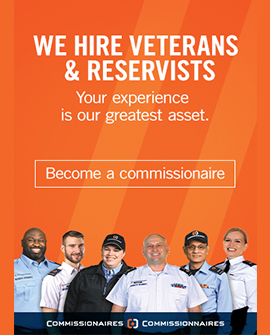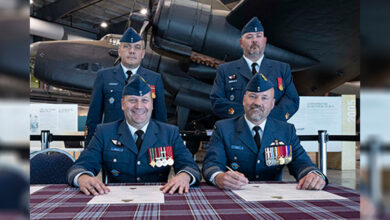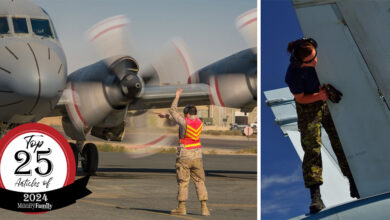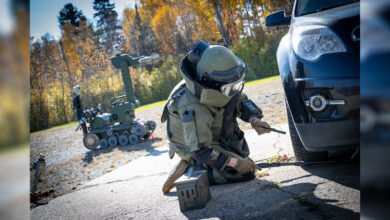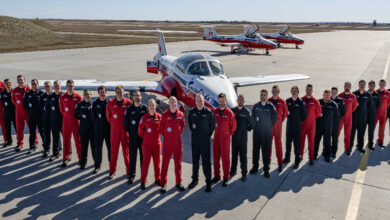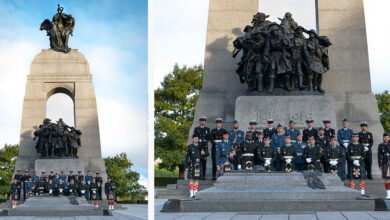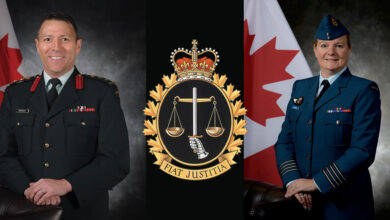Duty Calls
Government announces COVID-19 vaccines and distribution plan: Canadian Armed Forces
Above image: Prime Minister Justin Trudeau and Deputy Prime Minister Chrystia Freeland hosted a virtual Open Town Hall on Dec. 2, 2020. At the Town Hall meeting, Freeland mentioned the CAF would be administrating the vaccine under the leadership of Major General Dany Fortin.
Last night, Dec. 2, 2020, Prime Minister Justin Trudeau and Deputy Prime Minister Chrystia Freeland hosted an Open Town Hall, where they talked about many things, including the COVID-19 vaccine and its distribution.
Noting that people are tired of COVID-19, tired of having to go through all of the health restrictions, tired of being on guard for this, it was noted that the government wants it to be over.
With the government announcing, Canadians would have access to a vaccine, more details were revealed on how it would be administrated.
“We know that there is a vaccine on the horizon, and we are going to be able to get through this COVID-19 crisis,” said the Prime Minister.

During the townhall, Freeland touched on how impressed and grateful she is for the Canadian Armed Forces in relation to their response to taking care of seniors in the long-term care facilities in Quebec and Ontario in the spring.
“That’s why I am personally so grateful and so reassured by the fact that the Canadian Armed Forces are playing a key logistical role in ensuring that the vaccines get distributed delivered across the country. We should all thank Major General Dany Fortin. He was the NATO commander in Iraq, so I think he knows what he’s doing in tough situations, and that should give us a little more confidence too,” she says.
Freeland explained that there are some crucial things for all Canadians to know, the first point being these vaccines will be free.
“We have a national healthcare system. We take care of each other,” she commented.
“The coronavirus is a novel virus. That’s why it’s been hard to develop a vaccine. We haven’t known which vaccine would work. Vaccination is not a new thing, and it is something that the Canadian healthcare system knows how to do. Millions and millions of Canadians get vaccinated in their provinces and territories by their provincial and territorial healthcare systems every year. So we should rest assured that this is something we have a national system to do, and it’s going to work,” she added.
While the arrival of a vaccine won’t be right away because they are new vaccines and need to be approved, manufactured, and rolled out, not just around the country, but around the world, they’re on the way.
“We didn’t want to take the chance of putting all our eggs in one basket and going with one vaccine company and then having them not get the right vaccine, not get it out quickly or have particular challenges,” Trudeau stated.
“These coming months of winter will be difficult. We will get through them. As for vaccines, Canada knew early on from the spring that we needed to have access to a vaccine to get through it. So we started working extremely quickly to sign deals with as many different potential vaccine manufacturers as possible.
“We didn’t want to take the chance of putting all our eggs in one basket and going with one vaccine company and then having them not get the right vaccine, not get it out quickly or have particular challenges,” Trudeau stated.
He explained the government did this because, at the time, nobody knew which vaccine will be most effective and which vaccine will arrive first.
When people look at the news and see that four vaccine candidates are very advanced and very close to approval: AstraZeneca, Moderna, Johnson and Johnson, and Pfizer, Canada has deals with all of them for millions of doses for Canadians, and health Canada is already working through a rolling approval process.
Trudeau mentioned that who gets that first wave of vaccines is a really important question. It’s one that they’ve turned over to the experts: immunologists, doctors, and community specialists who actually know what the best path is.
Trudeau says it shouldn’t be a surprise that the vaccines will go to the most vulnerable first, whether it’s the elderly, frontline health workers, or remote indigenous communities that are facing real challenges.
Canada has bought 154 million doses of vaccines for a population of 37 million people with options of up to 400 million if necessary.
Before Canada gives the vaccine to any Canadians, it will make certain that it is safe for people.




